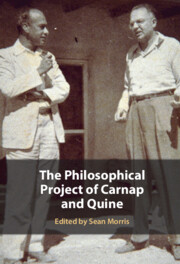Book contents
- The Philosophical Project of Carnap and Quine
- The Philosophical Project of Carnap and Quine
- Copyright page
- Dedication
- Contents
- Contributors
- Acknowledgments
- Introduction
- Part I Carnap, Quine, and Logical Empiricism
- Part II Carnap, Quine, and American Pragmatism
- Part III Carnap and Quine on Logic, Language, and Translation
- Chapter 7 Reading Quine’s Claim that Carnap’s Term “Semantical Rule” Is Meaningless
- Chapter 8 What Does Translation Translate? Quine, Carnap, and the Emergence of Indeterminacy
- Chapter 9 Quine and Wittgenstein on the Indeterminacy of Translation
- Chapter 10 Turning Point
- Part IV Carnap and Quine on Ontology and Metaphysics
- Bibliography
- Index
Chapter 9 - Quine and Wittgenstein on the Indeterminacy of Translation
from Part III - Carnap and Quine on Logic, Language, and Translation
Published online by Cambridge University Press: 18 February 2023
- The Philosophical Project of Carnap and Quine
- The Philosophical Project of Carnap and Quine
- Copyright page
- Dedication
- Contents
- Contributors
- Acknowledgments
- Introduction
- Part I Carnap, Quine, and Logical Empiricism
- Part II Carnap, Quine, and American Pragmatism
- Part III Carnap and Quine on Logic, Language, and Translation
- Chapter 7 Reading Quine’s Claim that Carnap’s Term “Semantical Rule” Is Meaningless
- Chapter 8 What Does Translation Translate? Quine, Carnap, and the Emergence of Indeterminacy
- Chapter 9 Quine and Wittgenstein on the Indeterminacy of Translation
- Chapter 10 Turning Point
- Part IV Carnap and Quine on Ontology and Metaphysics
- Bibliography
- Index
Summary
W. V. Quine is famous for insisting that translation is indeterminate and Ludwig Wittgenstein widely believed, not least by Quine himself, to have been committed to the same view of translation. Taking Quine at his word, I explore why he would think those conversant with the later Wittgensteins remarks on meaning would take the argument about translation in Word and Object in stride. I argue that Quine and Wittgenstein are, for all their differences, reasonably regarded as battling a commonly held philosophical conception of the determinateness of translation. As I read Quine, he had it right when in later work he emphasized that he should be understood as mounting an argument against propositions, and he – and Wittgenstein – are on much firmer ground than usually supposed. Also in an Afterword I point out that Rudolf Carnap, arguably Wittgensteins most important successor and Quines most important predecessor, largely agreed with the argument I attribute to Quine and Wittgenstein in the body of the text, his reservations about many of their views notwithstanding.
Keywords
- Type
- Chapter
- Information
- The Philosophical Project of Carnap and Quine , pp. 177 - 193Publisher: Cambridge University PressPrint publication year: 2023



